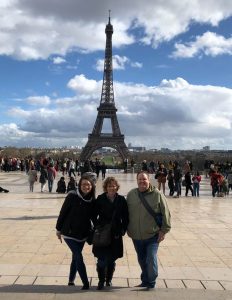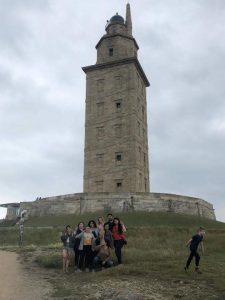Meet Your NILA Board: Exhibit Chair and NAATF President Cara Heminger
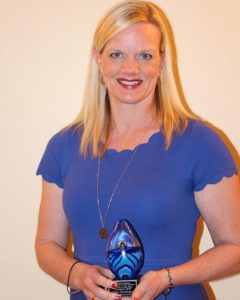 Cara Heminger
Cara Heminger
Department Chair, World Languages, French Teacher
Lincoln North Star High School
caraheminger@gmail.com
What was your motivation to become a language teacher?
My teachers in junior high and high school, Madame Peggy Ruch and Madame Susan Liden in Willmar, MN, were so enthusiastic about teaching us French that I fell in love with the language and culture the first time I sat in their classes. I took a European tour with them as a junior, then backpacked through Europe after college. I became an Assistante d’Anglais in Paris and then got my MA in French Literature. After, I knew I wanted to spend my life sharing my love for learning about other languages and cultures. Being a French teacher lets me share my passion each day!
Describe your classroom approach in five words or less.
Creating lifelong learners, challenging, inclusive.
What would you recommend to educators to build their pedagogy and practice?
I recommend that an educator approach their life and their teaching career with a positive attitude of learning from every experience. We can learn from each other as language teachers, from our students, from our administrators, from brand new teachers, from veteran teachers, and even from our experiences in the community. Take on every experience — every meeting, every class we take or teach, every interaction with someone new — with a curiosity for learning and for being empathetic. I believe we gain so much to broaden our own horizons when we approach our lives that way. This translates to our own teaching when we glean from others what will work with our different students and topics.
World Language Standards FAQs: A Conversation with the WL Specialist
The 2019 World Language Standards have been in place less than a week but there are many excited to know more about the document and the process. Below are some of the questions that have been asked regarding the new Nebraska World Language Standards. Got a question? Email stephanie.call@nebraska.gov.
What do the standards tell teachers to teach?
The Nebraska World Language Standards do not determine vocabulary, grammar, cultural content, or other static concepts. Instead, the standards focus on what students do with the language. These are proficiency-based standards, meaning students will demonstrate the knowledge and skills they learn in the world language classroom.
When will teachers be expected to create new curriculum?
There is no immediate pressure to create new curriculum. The Frameworks Implementation Guide suggests using this year to evaluate the curriculum that is in place. A comparison of the current curriculum and the standards may, or may not, reveal areas in need of strengthening. Once a thorough assessment is completed, districts will better know if a new curriculum or resource materials would be beneficial.
Why did ‘cognition’ replace ‘comparisons’ as one of the ‘Five C’s’ or world language strands?
The team decided that comparisons is inherent in everything. We compare products, perspectives, and practices in order to make meaning. We compare language as we learn structure. Eventually, we decided that it is a process that belonged in our indicators for every key area. As for the cognition piece, several members of the team brought experience with LinguaFolio, integrated performance assessments, or metacognitive research. We decided that this was a component that had to be included. Much of our state-wide community has long worked on what the teacher should do in the classroom. What better way to drive home the “I Can” than to make it a standard?
Wanderbus Coming to Deutschlandjahr at Bellevue West
The “Wanderbus” is coming to Bellevue West on September 20 from 10-12 for the Deutschlandjahr. The Wanderbus travels the United States, meeting people in their hometowns to share about their German heritage, about Germany, and about US German connections. The program is sponsored by the Goethe Institute in Washington, D.C. Spots are still available. Contact Amanda Messerschmitt at Amanda.messerschmitt@bpsne.net if interested in bringing your students.
Nebraska World Language Standards Approved
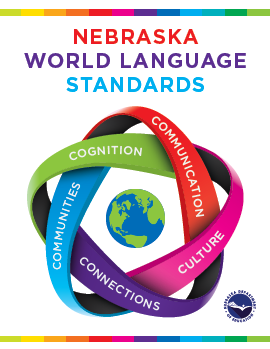 On September 6, 2019, the Nebraska State Board of Education approved the Nebraska World Language Standards. Culminating twenty months of research, discussion, brainstorming, and honing, the Standards present a framework for teaching and learning in second language acquisition at a level that encourages us to reach above, to go beyond, and to be reflective in practice. To view the Nebraska World Language Standards online, please visit the Nebraska Department of Education World Language Standards page.
On September 6, 2019, the Nebraska State Board of Education approved the Nebraska World Language Standards. Culminating twenty months of research, discussion, brainstorming, and honing, the Standards present a framework for teaching and learning in second language acquisition at a level that encourages us to reach above, to go beyond, and to be reflective in practice. To view the Nebraska World Language Standards online, please visit the Nebraska Department of Education World Language Standards page.
2019 NILA Conference Update: Free Workshop and Conference Events
2019 NILA Conference
Raising the Bar: Nebraska’s New World Language Standards
October 11-12, 2019
University of Nebraska Kearney
- Free Half-Day Workshop
- 25 Professional Sessions
- Lunch and Keynote
- Awards Ceremony
- Vendor Exhibits
- Association Meetings
- Opportunities to Network
- Door Prizes
- Stuff Swap
- (Bring items to exchange)
Friday Workshop with Keynote Presenter Stephanie Call
World Language Specialist Stephanie Call will introduce the new standards with activities, resources, and methods that are meant to provide practical and effective strategies to meet the bar. Come prepared to participate, to share, and to learn. Expect to have fun. Standards implementation packets will be provided to those in attendance.
The Friday workshop is available at no cost. It is from 1:00 to 4:00 in the Sandhills Room on the first floor of the Nebraskan Student Union.
Nebraska Welcomes New German Language Advisor
Recently, Nebraska welcomed a new German Language Advisor of the Central Agency for Schools Abroad in Nebraska, Leeni Martinkari will be taking over the role of Irene Mrázek, who has returned to Germany.
Could you please describe your background?
After graduating from Freie Universität Berlin and obtaining my teaching degree in German and English, I later added Theatre Studies and received my teaching certificate for School Theatre as well.
My latest teaching post was at an Upper Secondary School in Berlin-Weissensee, where I taught German, English and Performing Arts for eleven years, often adding some spark to my language classes using theatre methods. From 2014, I also taught refugee-classes, which were established in many Berlin schools that year. I was also responsible for the school’s contacts abroad and coordinated the students’ annual study-trips and internships to various European countries. I left the teaching profession in 2016 to work as a German Language Advisor in the region of Ohio, Michigan, Indiana and Kentucky.
What is your role as a language advisor?
I offer guidance for schools that wish to establish a DSD-program (German Language Diploma). I provide professional development workshops for teachers, workshops in cooperation with AATG, professional coaching in cooperation with the Goethe Institute, fun German workshops for students, information on studying in Germany, and every now and then workshops for students with German artists (music or theatre), when these are funded by the German Government. I am looking forward to working together with colleagues in Nebraska, promoting and supporting German language programs.
What is your contact information?
columbus@auslandsschulwesen.de
Chansons Françaises en Nebraska
If you are interested in hosting a French singer in your school, this coming Fall, Eric Vincent will perform in your area during mid-November. Eric Vincent’s songs are included in several major textbooks such as “Discovering French Today”: Blanc (Level 2) by Valette and Valette (Houghton Mifflin Harcourt), “SAM Contacts: Langue et Culture Françaises, 9th edition” by Valette and Valette (Heinle Cengage). If interested, contact Marie Claude Barbin at marieclaudebarbin@orange.fr. There are still availabilities and we propose a sharing receipts formula allowing the organizer to host a concert without financial risk. Please visit the Eric Vincent website.
World Language Standards Update: August 2019
Editors met in July to review the results from the Public Input Survey that was available from May to June. In response to the results of the survey, the language of the indicators was clarified to provide more clear and specific learning targets. Specific examples were also provided to support focus groups of language for heritage speakers and for classical languages.
The final draft of the standards was presented at the August meeting of the Nebraska State School Board for a first review. Two individuals spoke during the State Board’s public commentary period. Mary Lea Free, Spanish teacher at Norris Public School, read a statement of support from colleague Jacqueline Mohr, Syacuse Dunbar Avoca Schools. Mrs. Mohr wrote, “With the adoption of these standards, the Nebraska Department of Education is ensuring the world language education in the state remains one of the top in the nation while producing students who are 21st Century global learners.” Mrs. Free added, “The proficiency levels are well explained. They use a common knowledge that all of our teachers in Nebraska will relate to and use in the classroom.” Rebecca Gill Rose, Bennet Palmyra Public Schools Spanish teacher, presented to the Board that, “Today’s world language classroom is about real-world production of language and global awareness. These proposed standards speak to this.”
It is hoped that the State Board will adopt the standards at the September 2019 meeting. The final draft can be accessed on the World Language website.
Standards Workshops Coming Soon to Your ESU
The Revised Nebraska World Language Standards offer a greater emphasis on language production, global perspectives, and ownership in language learning. The NDE World Language Education Specialist offers an opportunity to talk about the revised world language standards and their potential impact to districts, to develop standards-based activities, and to collaborate with peers. Expect a fast-paced day with practical ideas, rich discussions, and a wealth of resources. Please enroll through the Educational Service Unit.
| ESU 1 | 21 Apr 20 | ESU 8 | 24 Apr 20 |
| ESU 2 | 22 Apr 20 | ESU 9 and 10 at ESU 9 | 16 Oct 19 |
| ESU 3 | 19 Feb 20 | ESU 11 | 07 Oct 19 |
| ESU 4 | 14 Feb 20 | 14 Nov 19 | |
| ESU 5 | 03 Oct 19 | ESU 13 | 12 Mar 20 |
| 20 Feb 20 | ESU 16 | 11 Mar 20 | |
| 05 Mar 20 | ESU 17 | 10 Mar 20 | |
| ESU 6 | 24 Oct 19 | OPS | 20 Sep 20 |
| 03 Mar 20 | |||
| ESU 7 | 23 Apr 20 |
Cognitive Benefits of Language Learning
As language educators, we can enumerate the cognitive benefits of language learning without thinking twice. However, this list of benefits does not often have its desired impact in advocacy. Our messaging regarding the cognitive benefits of world language learning can change. In debate terminology, we need the “link, brink, and impact”. The link is how we benefit from language learning. The brink is how these benefits could be generally beneficial. The impact is the ultimate consequence and must be tied to what matters to us most: basic, psychological, and self-fulfillment needs. Consider relating that list of benefits in terms of how each one has a personal impact on the daily life and expectations of your students. This compilation shows the link, brink, and impact of how language has cognitive benefits that affect us personally.
Meet Your NILA Board: Secretary Dr. Jonathan Dettman
Dr Jonathan Dettman, Secretary
Associate Professor of Spanish,
University of Nebraska Kearney
dettmanjc@unk.edu
What was your motivation to become a language teacher?
My experience as a college student was very positive and personally transformative. A big part of that was learning languages. I had a great deal of admiration for the teachers who had been my intellectual guides, and when I finished college, I contemplated becoming a Spanish teacher. I ended up taking the long route to teaching (through graduate school), but I think post-secondary education is a very good fit for me.
Describe your classroom approach in five words or less.
“I bet you didn’t know…”
How do you feel Nebraska is raising the standards for world language education?
Both NILA and NDE are very conscientious about staying informed about best practices and promoting them throughout the state. Since arriving in Nebraska in 2013, I’ve been impressed by the overall level of professionalism and commitment to teacher education.
What would you recommend to educators to build their pedagogy and practice?
Take time for professional development, even if that means organizing workshops and idea sessions for your colleagues–maybe you’re the teacher you’re looking for.
Teach in Nebraska: World Language Openings
The following positions were posted in June 2019 on the Teach in Nebraska website
Spanish 9-12, Full-Time, Cedar Catholic Jr.-Sr. High School, Hartington
Spanish 9-12, Full-Time, St. Thomas More School, Omaha
Spanish 9-12, Full-Time, Elgin Public Schools, Elgin
Spanish 9-12, Full-Time, Kearney High School, Kearney
World Language, 9-12, Full Time, Lourdes Central Catholic School, Nebraska City:
ALL LANGUAGES WILL BE CONSIDERED
Nebraska International Language Association Conference
NILA’s Annual Conference is October 11-12 at the University of Nebraska Kearney. This year’s event will feature support for the new world language standards as well as professional development offerings on timely topics. NILA has arranged for an evening social at Cunningham’s On the Lake and for a discount at a local hotel.
The Traveler’s Tales: Experiences from Abroad
From Lincoln to Le Tour Eiffel: High School Students Abroad
Lincoln Public Schools French teachers Will West, Sasha Van Zandt, and Kristen Tangen organized a trip to France for 22 students in March 2019. LPS has offered travel abroad for 50 years. The commitment to this experience remains strong as plans for a trip to France in 2020 continue.
What was your itinerary? We spent 5 days in Evreux, France for a family stay, and 3 days in Paris, visiting many sites and monuments.
Describe how this affected your understanding of the language. The LPS-sponsored trips have always included a family stay, because the main purpose has been for students to have that immersion experience where they are living with a family, practicing their language, making connections, experiencing what it’s like to go to school, hanging with their host sibling and his/her friends, etc. I feel their understanding of the language grows immensely…they find it frustrating, joyful, funny, embarrassing, thought-provoking, and educational! Students are often very nervous about the family stay, and yet many tell us afterwards that it was their favorite part and that they learned the most during that time.
What was your most unexpected surprise? I think the most unexpected or surprising benefit to students is how much they grow in their independence, self-knowledge, and desire to travel again in the future
What travel service did you use? LPS has traveled with ISE/Xperitas for many years (I think 40+ years), in part because this company offers a family stay experience.
From Crete to Costa Rica: High School Students Abroad
Spanish teacher Angela Wagoner organized and led a trip to Costa Rica in early June 2019 with her students at Crete High School.
What was the purpose of your travel? Student experience – they did some tourist travel and also did a short homestay with a family and took classes at a language academy.
Describe how this affected your students’ language growth. This is my third personal experience with Costa Rican Language Academy (CRLA) and their homestay and language program. It is rejuvenating to be immersed in Spanish each day. I feel my proficiency increasing as I am there and remembering things about the language and culture I feel I have forgotten or that do not stick when I am in the States.
What was your most unexpected surprise? How much the students immersed themselves in the culture. On the very first day in San José, multiple students went with their host families and did cultural experiences such as church, playing soccer/basketball with groups of people, and really just immersing themselves in the experience.
What travel service did you use? We used a mix of Explorica and the Costa Rican Language Academy (CRLA) services. For our next trip we will just be using CRLA – it is much cheaper and much more personalized experience.
From Kearney to A Coruña: Summer Study for College Students
Associate Professor of Spanish and Graduate Program Chair Dr. Michelle Warren organized and accompanied ten University of Nebraska Kearney students to La Universidad da Coruña, A Coruña, Spain during the month of June 2019.
What was the purpose of your travel? Students worked on their linguistic and cultural fluency.
Describe how students interacted with the community. Students lived with local families and attended classes at the University of A Coruña. They also participated in city and area excursions, ate tons of delicious local food (including octopus!), and enjoyed time on the coast.
What was the most unexpected surprise? While almost all of our students came to the program fluent in Spanish, none of them had ever spent time in Spain. Their biggest surprise was learning about regional differences between Latin America and Spain and cultural differences between Galicia and Spain. A Coruña is located in the autonomous province of Galicia.
What travel service did you use? Dr. Michelle Warren organized the trip in cooperation with the Universidad da Coruña and a local agency, Ad Astra, which provided housing. For more information or to reserve your spot on next year’s trip, email Dr. Warren at warrenm2@unk.edu
From Lincoln to La-Point-Du-Bout: Professional Development in Martinique
Lincoln Public Schools French teachers Lisa Maupin and Sasha Van Zandt traveled to the International Conference in La-Pointe-du-Bout, Martinique, sponsored by the American Association of Teachers of French (AATF) in July 2018. Maupin and Van Zandt presented a session entitled “Reaching Each Student Through Learning Stations, Technology and Authentic Resources”. They had the opportunity to learn about Martinique’s history, French colonization, the long-lasting effects of the slave trade in the French West Indies, the Creole language, culture and cuisine.
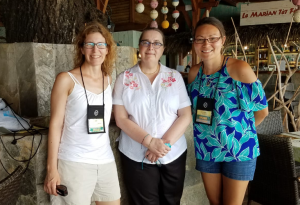
Lisa Maupin and Sasha Van Zandt with Catherine Daniélou, President of AATF (American Association of Teachers of French)
How did this experience impact you and your teaching?
“We have learned a wealth of information from our trip, not only within the sessions themselves and on the excursions, but through the everyday exposure to the people and culture of Martinique. Partaking of the food, hearing the language, seeing and smelling the flowers, walking the streets, shopping the markets – all of this is a treasure trove for a language teacher. The aggregate of these experiences is now brought back to the classroom and transformed how we teach, exposing in turn our own students to a rich and vital part of the francophone world” – Lisa Maupin
“It’s these kinds of experiences that continue to keep our flames and passion for teaching lit and allow us to keep our classrooms alive and connected. Learning that Martinique is a part of France, drawing connections between slavery in the US and slavery in Martinique, checking that Napoleon was really that short, finding out how much older Josephine was than Napoleon before they changed their birth dates, learning that 1 in 5 people are unemployed, or traveling virtually by mapping out flights and a hotel stay–these are small steps to becoming stronger global citizens, one of the main skillsets that a language teacher wants to develop in their students.” – Sasha Van Zandt
World Language Standards Update
The revision of the Nebraska world language standards continues. A public input survey was released in May to all world language endorsed teachers in the state, the Nebraska Department of Education website, and the Educational Service Units. Feedback has been processed and is under review. Once the review process and editing is complete, the updated draft will be presented to the Nebraska State Board of Education in August for a first review. It is hoped that the State Board of Education will approve the world language standards in September. To see the draft standards, visit www.education.ne.gov/worldlanguage.




